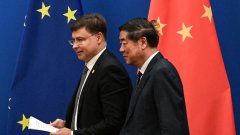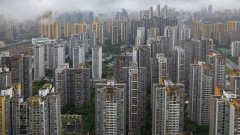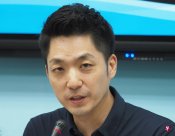Recently, news of high-level Chinese officials being investigated and dismissed comes one after another, from central enterprises to the financial system, from the Ministry of Foreign Affairs to the People’s Liberation Army... In the past month or so, it has been confirmed that three members of the 20th Central Committee have had accidents. It once again highlights the determination of the official high-pressure anti-corruption and rectification of officialdom, which is relentless and soft-hearted.
The latest wave of shocking cleansing operations involves the Rocket Force, a strategic service of the People's Liberation Army. It seems that with a wave of the hand, the highest level of the Rocket Army was "one pot", and both the commander and the political commissar were replaced, which also reflected the rumor that the two former deputy commanders were also investigated, and I am afraid it was not groundless.
At such a sensitive moment, Ju Gansheng, commander of the PLA Strategic Support Force, was absent from the reception for the 96th anniversary of the founding of the PLA on Monday (July 31), which once again aroused media suspicion that the rectification of the PLA is not limited to the PLA Rocket Force, but the giant Qiansheng may also have an accident.
The news about Li Yuchao, the former commander of the Rocket Army, was investigated. At the end of June, he was absent from the rocket army's military rank promotion ceremony, and clues have emerged. It was not until this Monday (July 31) when the Central Military Commission held a promotion ceremony for the rank of general that Wang Houbin and Xu Xisheng from the Navy and Air Force mentioned that they served as commanders and political commissars of the Rocket Army across military services. Military and political commissar Xu Zhongbo has resigned.
Wang and Xu have never served in the Rocket Army. This extremely rare cross-service promotion means that China's top leader has appointed two "outsiders" to take over the Rocket Army, which has a special military status and is described as "China's The core force of strategic deterrence".
Although the 62-year-old Xu Zhongbo has not been reported to be under investigation, he resigned before reaching the retirement age of 65, which is the 65-year-old retirement age for his main job in the military region. The situation is not optimistic. In addition, Liu Guangbin, the deputy commander of the Rocket Force, and Zhang Zhenzhong, the former deputy commander, are also under investigation, according to sources quoted by the South China Morning Post. People also remember that Wu Guohua, the former deputy commander of the Rocket Force, who had retired for three years, reportedly died of illness on July 4 this year. Summarizing these, the high-level situation of this important military service is so dense that it is jaw-dropping.
According to the "South Morning" report, this series of investigations was launched in late March this year after Wei Fenghe, the former Minister of National Defense and the first commander of the Rocket Force, retired. How many people will be involved in this rapid anti-corruption operation? Everyone is full of question marks, feeling that the storm is about to come.
And less than a week ago, Chinese State Councilor and Foreign Minister Qin Gang was just removed from his position as foreign minister, and the official did not explain the reason. Li Yuchao, Xu Zhongbo, and Qin Gang all became members of the Central Committee after the 20th National Congress in October last year. Officials have not announced whether they violated discipline, but unfavorable rumors about them are rampant, and the official will not refute the rumors.
Some overseas commentators questioned "What happened to China?" Undoubtedly, this shows that China's system is highly opaque, and there is a clear gap with the requirements of modern society. On the other hand, it also clearly highlights that even after the 20th National Congress of the Communist Party of China, the anti-corruption and strict party governance are still unrelenting after the supreme leader's power has been "unified". For officials who have made mistakes, the high-level officials are not pretending to be accountable, and they do not shy away from influence.
According to incomplete statistics, since the beginning of this year, more than 60 cadres at the provincial management level and above have been investigated and investigated in China's financial system. Since the 20th National Congress of the Communist Party of China, 32 provincial and ministerial-level "tigers" have been sacked.
In addition to violations of discipline and regulations, officials have made mistakes or inactions in performing their duties, and high-level officials are merciless in pursuing accountability. For example, the investigation team of the State Council announced in May this year the collapse of a building in Changsha, Hunan Province last year. Hu Henghua, the current mayor of Chongqing, who had left his post as party secretary of Changsha for a year and a half when the accident happened, was also included in the investigation and was warned by the party.
According to this trend, it is possible that former foreign minister Qin Gang was dismissed because of his personal life style.
But Yan Guiyan, since the 18th National Congress of the Communist Party of China, there have been more than 10 years of high-pressure anti-corruption, and there are still so many "tigers" who have fallen, which proves that corruption is really a persistent disease in Chinese officialdom.
Some Chinese media have described the emergence of a "relay race" of corruption in many cities. For example, Kunming, the capital of Yunnan Province, has three successive party secretaries involved in corruption.
In Taiyuan, Jiangxi Province, there were also three former and former secretaries "lost". Ironically, Chen Chuanping, secretary of the Taiyuan Municipal Party Committee, was found to have accepted bribes of 910,000 yuan (RMB, the same below, SGD 170,000) in the first trial in 2016, but Chen Chuanping's full-time driver and secretary took bribes of 930,000 yuan, which was even more than him. It can be seen that there are many opportunities for corruption around the chief official. If the chief official is not aware of it, a small corruption circle will be formed.
It can be seen that China's anti-corruption campaign is far from over. According to a reporter from Lianhe Zaobao, in the judicial system of cities in some developed regions, some middle-level personnel are extremely wealthy. If they are not involved in political issues, they may only confess to some small cases when they are investigated, and they will be sentenced to light sentences. .
In the final analysis, the root of corruption lies in China's highly centralized and unified system of power. At each level, power is highly concentrated. The chief official has great decision-making power, the subordinates and the people have weak supervision, and information is not transparent. It is extremely difficult to prevent corruption from the source. Even if we continue to carry out a lot of ideological education work, we cannot completely curb the "corruption of the past and the successor of the past."
These years of high-pressure anti-corruption are aimed at combating and deterring corruption on the bright side. Of course, it also has an effect, that is, it has made most people restrained on a large scale, and the corrupt behavior of some people has changed from blatant to covert and more serious. hidden.
However, since it is difficult for China to have a choice to replace the existing system in the short term, this kind of high-pressure and deterrent anti-corruption can only be on the way forever, and all previous efforts may be wasted if it is lax. So far, some people have gradually become numb to the anti-corruption achievements, and the tense atmosphere has also affected the enthusiasm of officials. This is the price that officials need to bear. We can only continue to observe what long-term impact it will have on China's development.




